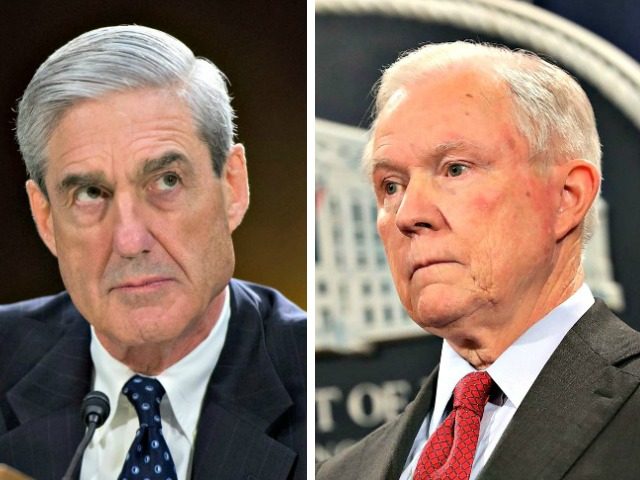Attorney General Jeff Sessions spent “several hours” being interviewed by investigators from Special Counsel Robert Mueller’s office last week, a Justice Department (DOJ) spokeswoman told the New York Times Tuesday.
According to the Times, Sarah Isgur Flores, the DOJ’s Director of Public Affairs, confirmed what would be the first interview of a Trump cabinet member in the course of Mueller’s investigation.
It was Sessions’ own controversial recusal from the investigation of supposed collusion between the Trump campaign, on which he served, and Russia that paved the way for Mueller’s appointment as special counsel by Sessions’ number-two, Deputy Attorney General Rod Rosenstein.
With authority only to investigate “links and/or coordination between the Russian government and individuals associated with the campaign of President Donald Trump,” Mueller’s Russia invesigation has instead made three sets of indictments of former Trump associates – against one-time manger Paul Manafort and his lobbyist partner Richard Gates, former low-level foreign policy staffer George Papadopoulos, and former National Security Advisor Gen. Micheal Flynn – none of which involve or have any obvious connection to any “collusion,” “links and/or coordination” with Russia.
The Special Counsel’s Office is also coming under a growing wave of criticism, mostly from the political right, over revelations of bias and antagonism against Trump centered around the hundreds of texts between FBI Agent Peter Strzok and FBI lawyer Lisa Page. Strzok, a high level official in both the Clinton email and Mueller “Russia” investigations until his demotion when the DOJ Office of the Inspector General uncovered the texts, apparently saw the Russia investigation as an “insurance policy” in case his prefererred presidential candidate, Hillary Clinton, lost the 2016 election. Some reports Tuesday are suggesting Strzok may also have specifically said he did not think there was actually any collusion.
A new wrinkle in the Strzok-Page controversy hit this weekend when it became known the FBI no longer has five crucial months – spanning the presidential transition and the beginning of the Russia probe – of texts between the pair. In response, Sessions announced Monday he would be conducting an investigation into these missing communications by Mueller’s former associate. In a statement announcing the investigation, Sessions said:
After reviewing the voluminous records on the FBI’s servers, which included over 50,000 texts, the Inspector General discovered the FBI’s system failed to retain text messages for approximately 5 months between December 14, 2016 to May 17, 2017…. I have spoken to the Inspector General and a review is already underway to ascertain what occurred and to determine if these records can be recovered in any other way. If any wrongdoing were to be found to have caused this gap, appropriate legal disciplinary action measures will be taken.
We will leave no stone unturned to confirm with certainty why these text messages are not now available to be produced and will use every technology available to determine whether the missing messages are recoverable from another source. If we are successful, we will update the congressional committees immediately.
Sessions was represented in his interview with Mueller’s investigators by his attorney, former Assistant Attorney General Charles “Chuck” Cooper. A fixture of the Washington conservative legal community for more than thirty years, Cooper is a fellow Alabamian and University of Alabama Law School grad to Sessions. The two were both among President Ronald Reagan’s political appointees at the Department of Justice in the 1980s.
The exact subject matter of Sessions’s interview was not clear, and DOJ did not issue a statement. Without citing evidence, the Times claims:
Mr. Mueller’s interest in Mr. Sessions shows how the president’s own actions helped prompt a broader inquiry. What began as a Justice Department counterintelligence investigation into Russia’s election interference is now also an examination of whether Mr. Trump tried to obstruct the inquiry, and the nation’s top law enforcement officer is a witness in the case.
The Times report suggests Sessions’ involvement in and knowledge of the firing of FBI Director James Comey may have prompted the interview.
UPDATE — 6:38 P.M. Eastern:
President Trump told reporters Tuesday afternoon he was “not at all” worried about Sessions’s interview with Mueller’s people.

COMMENTS
Please let us know if you're having issues with commenting.